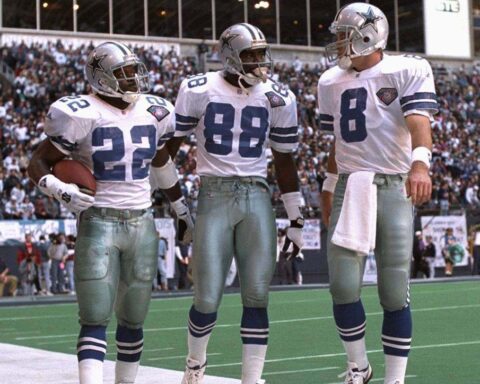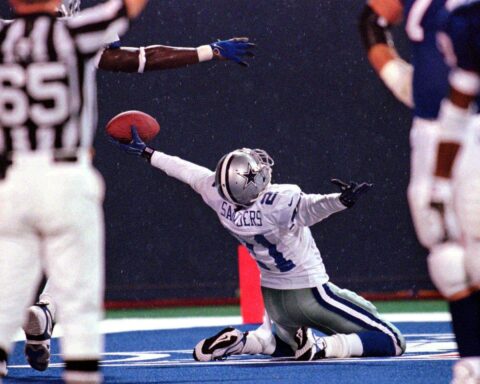The speed of developments in the legal battle between Michael Irvin and Marriott is picking up steam. On Wednesday Irvin and his attorney, Levi McCathern, held a press conference to discuss the details of the situation from their perspectives.
Since then, District Judge Amos L. Mazzant III has lambasted Marriott for failing to comply with his previous order to turn over materials by Tuesday.
The judge also issued a new order with fewer protections on the content of the materials, and Marriott finally began to release details of the allegations against Michael Irvin.
THE LATEST DEVELOPMENTS
Last week, Judge Mazzant ordered Marriott to turn over relevant surveillance video and other materials by no later than 5 pm on Tuesday.
During the press conference on Wednesday, McCathern revealed that although Marriott’s counsel allowed him to view the surveillance video, they did not allow him to take a copy or make one.
He was not even able to show his client what the video revealed.
Initially, Judge Mazzant’s order allowed Marriott to redact parts of the video and statements. Marriott deemed some information to be too sensitive for public release. Out of concern for the accuser’s safety, they wanted to keep details sealed.
However, Mazzant viewed Marriott’s handling of the situation this week as noncompliance with that order.
He then ordered the information to be released unredacted and said that Irvin and McCathern may share details with the public.
Regarding the surveillance video, McCathern says, “I think people need to see the video and judge it for themselves.” However, according to reports, the meat of the allegations against Michael Irvin are related to his words, not his actions.
MARRIOTT’S MOTION
In a motion filed this week, following Michael Irvin’s Tuesday morning press conference, Marriott alleged, “Irvin’s counsel provided a self-serving, inaccurate summary of the video footage Marriott produced, including his claim that the footage proves Irvin did nothing wrong and then turned the microphone over to Irvin to make racially charged statements.”
Then, in the motion, they outlined their own interpretation of the contents of the surveillance video.
McCathern’s account of the video suggested that the interaction between Michael Irvin and his accuser was void of any inappropriate actions. Marriott’s description, however, told a much different story.
Marriott’s attorneys described Irvin as being “visibly intoxicated” when he approached the accuser, shook her hand, and asked if she was a football fan.
Their account of the events continued, “Irvin also reached out and touched the Victim’s arm during this conversation without her consent, causing her to step back, becoming visibly uncomfortable. Irvin then asked the Victim whether she knew anything about having a ‘big Black man inside of [her].'”
In Mariott’s 28-page motion, they only identified the accuser as “victim.”
They claimed that Irvin touched the victim’s arm without consent, she responded by backing away, and he moved in closer.
After that, according to Marriott’s motion, Irvin ended the conversation when he noticed hotel security watching the interaction.
“Seeing that other hotel employees were in the area and wanting the interaction to end, the Victim returned Irvin’s handshake,” Marriott’s counsel wrote.
“Irvin then stated that he would come back to find her sometime that week when she was working.”
WHAT HAPPENS NEXT
Assuming Marriott complied with the court’s order and McCathern’s sentiments were genuine, the surveillance video in question will be released soon.
The release of the video will be imperative in determining the public’s perception of this entire situation.
The account by Irvin’s attorney differs greatly from the account of Kendall Hayden, Marriott’s representation.
Since Irvin himself did not entirely remember the encounter, Judge Mazzant presumably has not seen the video, and the public has not seen it, viewing the surveillance footage may provide much-needed clarity for those involved with the case as well as those following it.
There’s also the question of whether or not the consequences faced by Michael Irvin are warranted based on his actions and statements.
The interpretation of Irvin’s alleged statements, especially the notion of him “finding” the employee sometime that week might turn out to be vital to the ultimate ruling on this case.



